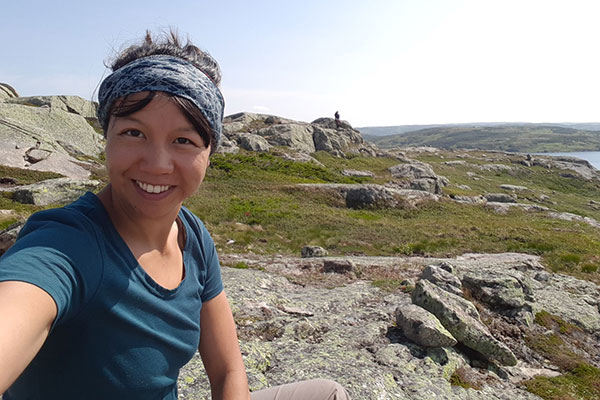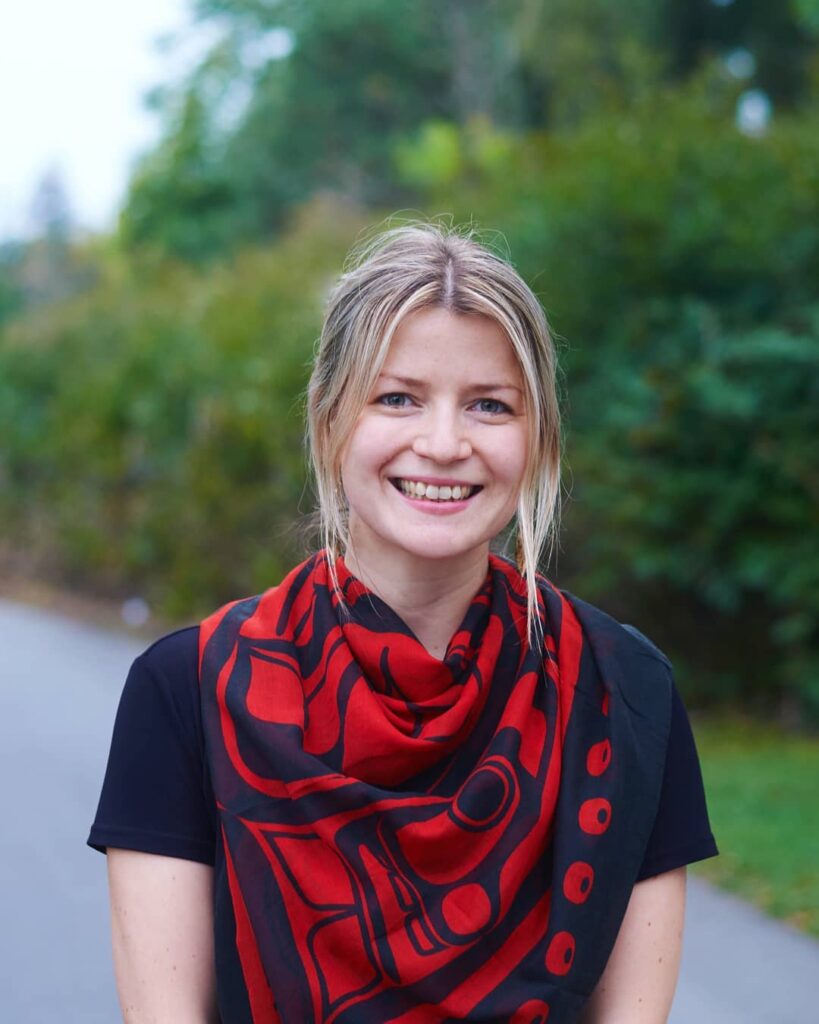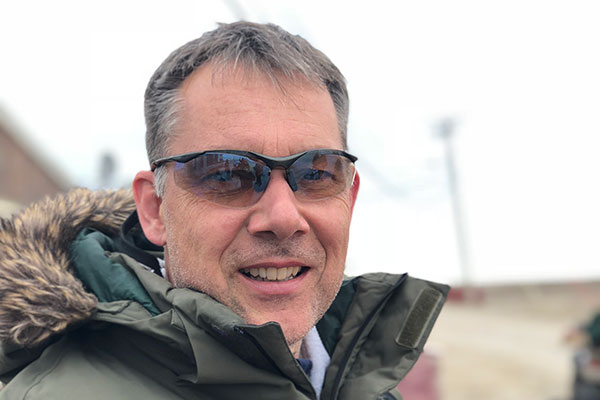“Hello! I am an Assistant Professor in the Institute of Environmental and Interdisciplinary Science at Carleton University, with a cross-appointment in the Department of Biology. I am a mixed-breed between a biologist and sociologist. I bring an applied lens to my research to ensure that knowledge we produce is usable and has maximum value for solving today’s wicked problems. I embrace inter- and trans-disciplinary principles in my work including knowledge co-production, co-creation, and commit to engaging in knowledge mobilization activities to influence perspective, policy and practice.
I obtained a B.Sc. in Environmental Science with Minors in Biology and Business. My M.Sc. in Biology integrated fish ecology with human dimensions research to evaluate management strategies for improving Pacific salmon bycatch survival. I examined attitudes and behaviours of fishers towards using fishing best practices, while also conducting biotelemetry, physiological, and reflex assessment research on the survival and behaviour of bycatch salmon in the Fraser River, B.C. For my Ph.D., I dove into sociology and investigated how new knowledge derived from new technology, namely biotelemetry, is or can be mobilized into fisheries management policies and practice. I am a Mitacs Canadian Science Policy Fellow alumni (17-18) and worked with the Office of the Chief Scientist at Natural Resources Canada for two years to influence and learn about science policy and government processes.
As you can see, the common theme throughout my career is connecting, integrating and bringing together different disciplines, knowledge systems, and cultures. I am committed to continuing interdisciplinary research and equipping the next generation with skills to solve societal and environmental challenges”
Publications
2025
83. Provisioning fisheries: A framework for recognizing the fuzzy boundary around commercial, subsistence, and recreational fisheries
2025
82. Taking knowledge exchange to practice: A scoping review of practical case studies to identify enablers of success in environmental management
2025
81. Community experiences and perceptions of aquatic change in ᑭᙵᐃᑦ, ᓄᓇᕗᑦ (Kinngait, Nunavut)
2024
80. Best practices for producing actionable knowledge to inform fisheries management and conservation
2024
79. Embracing implementation science to enhance fisheries and aquatic management and conservation
2024
78. Analysis of Public Comments on Experimental Regulations for Protecting Black Bass during The Spawning Period in Eastern Ontario Reveals Both Stakeholder Acceptance and Skepticism
2024
76. Whose authority drives the narrative? Framing Mountain Pine Beetle in Canadian news media
2023
74. Constructing the public in public perceptions research: A case study of forest genomics
2023
73. Implementing and evaluating knowledge exchange: insights from practitioners at the Canadian Forest Service
2023
72. Enablers, barriers, and future considerations for living lab effectiveness in environmental and agricultural sustainability transitions: A review of studies evaluating living labs
2023
71. Exploring the hidden connections between information channel use and pro-environmental behaviour among recreational anglers of the shore-based shark fishery in Florida, U.S
2023
70. Collaboration between local Indigenous and visiting non-Indigenous researchers: practical challenges and insights from a long-term environmental monitoring program in the Canadian Arctic
2023
69. Insights from the remote co-creation of an Indigenous knowledge questionnaire about aquatic ecosystems in Kinngait, Nunavut
2023
68. Managing Canadian freshwater fisheries: persistent challenges and opportunities for growth
2023
67. Environmental Evidence in Action: on the Science and Practice of Evidence Synthesis and Evidence-Based Decision-Making
2023
66. Making the most of aquatic animal tracking: a review of complementary methods to bolster acoustic telemetry
2023
65. Bridging Indigenous and Western sciences: Decision points guiding aquatic research and monitoring in Inuit Nunangat
2023
64. A systematic map of knowledge exchange across the science-policy interface for forest science: How can we improve consistency and effectiveness?
2022
62. Community participation in coastal and marine research and monitoring in Inuit Nunangat: A scoping literature review
2022
61. A research agenda for evaluating living labs as an open innovation model for environmental and agricultural sustainability
2022
60. Developing a National Level Evidence-Based Toolbox for Addressing Freshwater Biodiversity Threats
2022
59. Do environmental systematic reviews impact policy and practice? Author perspectives on the application of their work
2021
58. On the theory-practice gap in the environmental realm: Perspectives from and for diverse environmental professionals
2021
57. Promises and pitfalls of digital knowledge exchange resulting from the COVID-19 pandemic
2021
56. Fisheries knowledge exchange and mobilization through a network of policy and practice actors
2021
55. Survey-derived angler characteristics and perspectives in the shore-based shark fishery in Florida
2021
53. A research agenda for affective dimensions in climate change risk perception and risk communication
2021
52. Supporting actionable science for environmental policy: Advice for funding agencies from decision-makers
2021
50. Mobilizing practitioners to support the Emergency Recovery Plan for freshwater biodiversity
2021
49. Researcher perspectives on challenges and opportunities in conservation physiology revealed from an online survey
2021
48. COVID-19 restrictions and recreational fisheries in Ontario, Canada: Preliminary insights from an online angler survey
2021
47. An optimistic outlook on the use of evidence syntheses to inform environmental decision-making
2021
46. Moving toward Generalizability? A scoping review on measuring the impact of Living Labs
2021
45. Shifting baselines and social license to operate: Challenges in communicating sea lamprey control
2021
44. Overcoming barriers to transfer of scientific knowledge: integrating biotelemetry into fisheries management in the Laurentian Great Lakes
2021
43. Knowledge co-production: A pathway to effective fisheries management, conservation, and governance
2020
42. On “success” in applied environmental research – What is it, how can it be achieved, and how does one know it has been achieved?
2020
39. Diverse perspectives on interdisciplinarity from the Members of the College of The Royal Society of Canada
2020
38. “Consulted to death”: Personal stress as a major barrier to environmental co-management
2019
37. Conducting and interpreting fish telemetry studies: considerations for researchers and resource managers
2019
36. Collaboration and engagement produce more actionable science: quantitatively analyzing uptake of fish tracking studies
2019
35. What is ‘usable’ knowledge? Perceived barriers for integrating new knowledge into fisheries management of an iconic Canadian fishery
2019
34. Biotelemetry informing management: case studies exploring successful integration of biotelemetry data into fisheries and habitat management
2018
33. Applying a knowledge-action framework for navigating barriers to incorporating telemetry science into fisheries management and conservation: a qualitative study
2018
32. Embracing disruptive new science? Biotelemetry meets co-management in Canada’s Fraser River
2017
31. Envisioning the future of aquatic animal tracking: Technology, science, and application
2017
27. A roadmap for knowledge exchange and mobilization research in conservation and natural resource management
2017
26. To share or not to share in the emerging era of big data: Perspectives from fish telemetry researchers on data sharing
2016
25. Do fishing education programs effectively transfer ‘catch-and-release’ best practices to youth anglers yielding measurable improvements in fish condition and survival?
2016
24. How do potential knowledge users perceive and evaluate new claims about a contested resource? The problem of different expectations in knowledge exchange and mobilization
2016
22. Knowledge users’ perspectives and advice on how to improve knowledge exchange and mobilization in the case of a contested fishery
2016
20. Necessary but challenging: multiple disciplinary approaches to solving conservation problems
2016
19. Getting past the blame game: convergence and divergence in perceived threats to salmon resources among anglers and indigenous fishers in Canada’s lower Fraser River
2016
18. The need for speed in a crisis discipline: perspectives on peer review duration and implications for conservation science
2015
16. How long is too long in contemporary peer review? Perspectives from authors publishing in conservation biology journals
2015
15. Catching sharks: recreational saltwater angler behaviours and attitudes regarding shark encounters and conservation
2014
13. Disentangling the roles of air exposure, gill net injury, and facilitated recovery on the post-capture and release mortality and behavior of adult migratory sockeye salmon
2014
12. Bycatch mortality of endangered coho salmon: impacts, solutions, and aboriginal perspectives
2013
11. Perspectives of fishers on turtle bycatch and conservation strategies in a small-scale inland commercial fyke net fishery
2013
10. Recreational anglers’ attitudes, beliefs, and behaviors related to catch-and-release practices of Pacific salmon in British Columbia
2013
9. Mobilizing new science into management practice: the challenge of biotelemetry for fisheries management, a case study of Canada’s Fraser River
2013
8. To tag or not to tag: animal welfare, conservation and stakeholder considerations in fish tracking studies that use electronic tags
2013
7. Evaluation of a simple technique for recovering Pacific salmon from capture stress: integrating comparative physiology, biotelemetry, and social science to solve a conservation problem
2013
6. Scientific and stakeholder perspectives on the use of circle hooks in recreational fisheries
2012
5. Aboriginal fisher perspectives on use of biotelemetry technology to study adult pacific salmon
2012
4. Differences in information use and preferences among recreational salmon anglers: implications for management initiatives to promote responsible fishing
2011
3. Fish movement and migration studies in the Laurentian Great Lakes: Research trends and knowledge gaps
2011
2. Generation of priority research questions to inform conservation policy and management at a national level
2009
1. The post-release behaviour and fate of tournament-caught smallmouth bass after ‘fizzing’ to alleviate distended swim bladders




